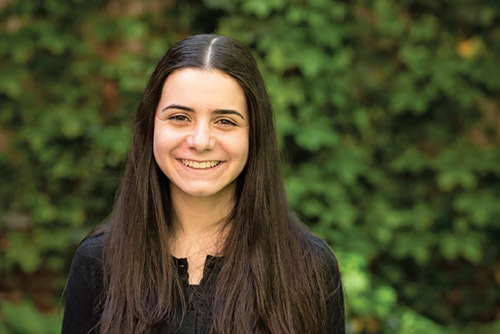

New York—Yeshiva University’s focus on advanced undergraduate level research continues to intensify with the selection of five exceptional students for the Bertha Kressel Research Scholarship in 2017-2018. The scholarship—established in 2008 by Dr. Henry Kressel, Yeshiva University chairman emeritus, managing director of Warburg Pincus LLC and a Yeshiva College graduate—offers students the unique opportunity to craft a year-long intensive research project under the direct supervision of YU faculty. This year’s recipients include Karen Neugroschl of Bergenfield and siblings Yael Eisenberg and Yishai Eisenberg of Passaic.
The scholars will each receive a stipend of $4,000 for the year, along with appropriate research-support expenses. Following their research tenure, Kressel Scholars will be encouraged to share their work in professional and peer circles to stimulate a larger intellectual discussion on their chosen topics, which range from nanophysics to English literature and breast cancer research.
Karen Neugroschl will study truth in American politics by assessing partisan differences in factual accuracy with Dr. Joseph Luders, David and Ruth Gottesman Professor of Political Science. “My research project will explore to what extent ideology plays a role in partisan policy agendas over facts,” she said. “Focusing on statements made by members of Congress, I will create a data set of references to academic scholarship or expert information in order to determine if there is a difference between the overall frequency in which Democrats and Republicans cite such sources. In addition, through several steps, I will evaluate the reliability of the sources and the individual scholars that are cited. Through this process, I hope to be able to determine the degree of accuracy and reliability for both Democratic and Republican lawmakers.”
For Neugroschl, who will also serve as student council president next year and hopes to pursue a career in law, the potential significance of her research is especially meaningful. “In 2015, just 19 percent of the country was estimated to have trust in government,” she said. “This incredibly low number is certainly related to the belief that Americans are being misled by their politicians. If through my research I can determine to what extent facts or ideology are involved in politics, it can help shape the public’s perspective on government.”
Under the supervision of Dr. Marian Gidea, professor of mathematics, Yael Eisenberg will conduct research in Bar-Ilan University this summer as she uses mathematical analysis to investigate brain activity.
“I’ll be operating the magnetoencephalography machine, or MEG machine, which is a non-invasive technique used to collect brain data,” she said. “I’m looking to see if different areas of the brain are stimulated when a simple arithmetic problem is presented in numbers versus words. If the research supports the hypothesis that different areas of the brain are used to answer the same question when it’s presented in different ways, that information can empower people who are ‘stronger’ in one area of the brain or who have brain damage in a specific area of the brain to utilize that strength to solve problems they previously thought were beyond their capacity.”
Ultimately, Yael hopes to pursue a doctoral degree in mathematics. “I believe that the Kressel fellowship will give me the tools necessary to set myself up for future math research in graduate school and beyond,” she said.
Her brother, Yishai Eisenberg, will be advised by Dr. Fredy Zypman, professor of physics, as he studies charge density measurement with nanometer precision. “We will attempt to create algorithms for interpreting results of an Atomic-Force Microscope scanning,” he said. “The microscope scans an object a few nanometers in length with a needle. As the needle vibrates, the microscope can interpret its position as a function of the voltage between the needle and the specimen. Using this voltage, we will try to reconstruct a map of the charge on the object’s surface.”
For Yishai, his research with Zypman at Yeshiva College has been the most exciting part of his undergraduate education. “I specifically recall hypothesizing a certain model and after weeks of computer programming and debugging, we found it consistent with the theoretical results,” he said. “This scholarship gives me the opportunity to conduct this fascinating research and present my results to a larger academic community.”









